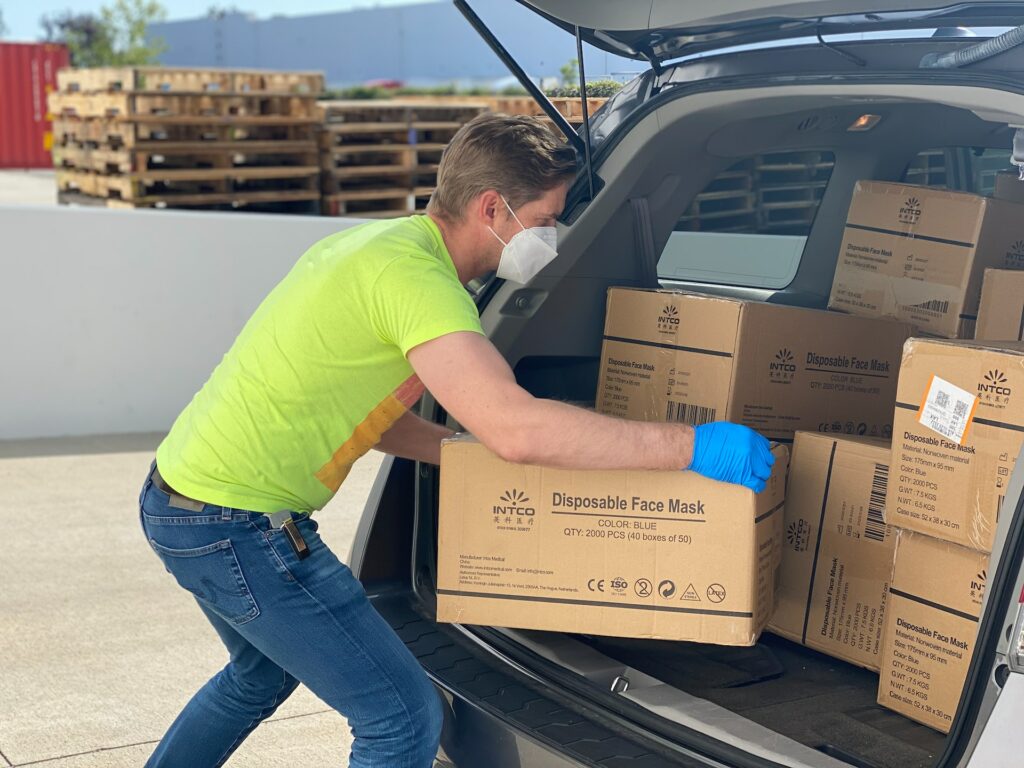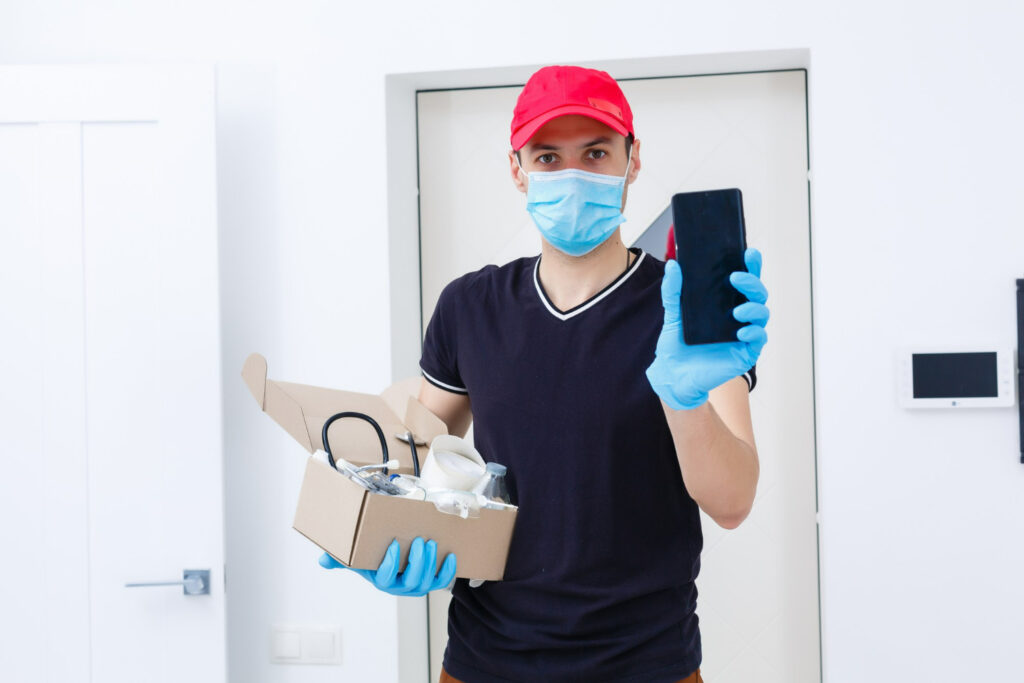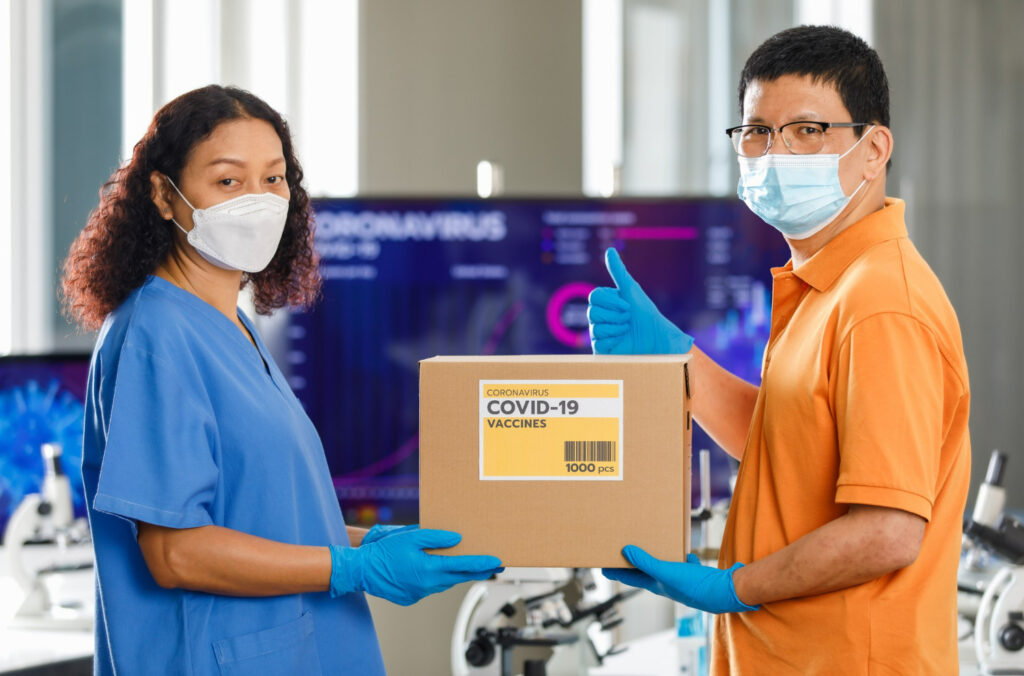The demand for medical courier services will grow significantly in the coming years. As the population ages and the healthcare system becomes increasingly complex, there will be a need for reliable courier services that can transport medical supplies quickly and efficiently.
If you’re considering starting your medical courier service, now is the time to do it! This guide will give you everything you need to know about getting started in the medical courier service industry.
We’ll cover licensing and insurance requirements, what services to offer, how to find clients, and more. So, if you’re ready to start your medical courier service, keep reading!

The Benefits of Setting Up A Medical Courier Business
Untapped Market Potential
The healthcare industry continues to grow, with a global healthcare market estimated to reach $7.9 billion by 2023, according to Yahoo. Medical courier services, which facilitate the timely and safe transportation of sensitive materials, are in high demand.
Starting a medical courier business allows you to tap into this growing market. Healthcare providers, laboratories, and pharmaceutical companies constantly require reliable and efficient courier services to transport critical items, such as diagnostic samples, medications, and medical equipment.
This demand creates a lucrative niche market opportunity.
Entrepreneurial Autonomy
Starting and running a medical courier business provides entrepreneurs with a degree of autonomy and flexibility. You can make key decisions regarding the business’s structure, operations, and growth strategies.
You can tailor your services to meet specific client needs, allowing creativity and innovation in your business approach.
Social Impact
A medical courier business is crucial in the healthcare ecosystem. By ensuring the timely and secure transport of medical supplies and specimens, you contribute to the well-being of patients and the efficiency of healthcare institutions.
Your services help in the diagnosis, treatment, and overall health of patients by ensuring that medical specimens and supplies are delivered promptly, which can be particularly critical in emergencies.
Diverse Service Offerings
A medical courier business can offer a wide range of services to meet the varied needs of healthcare providers. These services can include transporting blood samples, organ transplants, medical records, pharmaceuticals, and medical equipment.
Diversifying your service offerings can help you tap into different niches within the healthcare industry, increasing your revenue potential and customer base.
Challenges Within The Medical Courier Industry
Regulatory Compliance
Strict regulations govern the transportation of medical materials, such as blood, tissues, pharmaceuticals, and medical devices. Compliance with these regulations can be challenging, as they may vary by region or change over time.
Companies in this industry must stay updated with evolving laws and standards to avoid legal issues and fines.
Here are some examples of regulations in various countries:
United States
- HIPAA (Health Insurance Portability and Accountability Act): HIPAA regulations in the U.S. require protecting and confidential handling of patient health information during transportation. Medical couriers must have policies and procedures in place to safeguard this data.
- FDA (Food and Drug Administration) Regulations – The FDA oversees the transportation of pharmaceuticals, medical devices, and biologics. These regulations include requirements for temperature monitoring, security, and documentation of shipments.
European Union
- Good Distribution Practice (GDP): GDP guidelines apply to distributing medicinal products for human use within the EU. These guidelines set standards for the transportation of pharmaceuticals, including temperature control and security.
Canada
- Health Canada Regulations: Health Canada regulates the transport of pharmaceuticals, medical devices, and controlled substances. Compliance includes adhering to Good Distribution Practices (GDP) and specific licensing requirements for controlled substances.
Australia
- Therapeutic Goods Administration (TGA): TGA oversees regulating medical products, including their distribution. Regulations cover temperature monitoring, handling, and security during transportation.
Handling Sensitive Materials
Medical couriers transport many sensitive materials, ranging from biohazardous substances to temperature-sensitive items.
The handling of biohazardous materials necessitates adherence to strict safety and disposal protocols to protect couriers, the environment, and public health.
Temperature-sensitive items, such as organ transplants or blood samples, require specialized equipment to maintain precise temperature control throughout transport, ensuring the integrity of the specimens.
Initial Investment and Operating Costs
The medical courier industry demands significant initial investments and ongoing operating expenses. Specialized vehicles are necessary, often equipped with refrigeration units to maintain the appropriate temperature for medical materials.
These vehicles also need advanced security features and tracking systems. Acquiring and maintaining such vehicles can be expensive.
Furthermore, medical courier companies must invest in robust insurance coverage due to the sensitive nature of their cargo, which contributes to high operating costs.
| Start-up costs | Ballpark range |
| License & permits | $300 – $1000 |
| Insurance |
|
| Marketing & advertising | $1000 – $3000 |
| Website | $1000 – $3000 |
| Courier certification | $100 – $300 |
| Equipment Costs | $10,000 to $125,000 |
| Payroll | 25% to 50% of your total budget |
Customer Trust and Retention
Maintaining customer trust is paramount in the medical courier industry. Ensuring the security and privacy of medical data is a foundational aspect of this trust, particularly when handling sensitive patient information.
To sustain the trust of healthcare providers and patients, couriers must consistently meet delivery deadlines, as any delays can have serious consequences for patient care.
Reliability and timeliness are central to building and preserving these vital customer relationships.
Employee Recruitment and Retention
Hiring and retaining qualified personnel in the medical courier industry presents a unique challenge. Employees require specialized training to handle medical materials, adhere to strict regulations, and ensure the safety and security of the cargo.
The high turnover rate in courier work can disrupt operations and lead to increased recruitment and training costs.
Companies must implement effective strategies for employee recruitment and retention to mitigate these challenges and maintain a skilled and stable workforce.

Steps To Start Offering Medical Courier Services
If you’re looking to start a medical courier service, there are a few things you’ll need to do to get started. Such things are the following:
Conduct Thorough Market Research
Conducting extensive market research is essential before starting your medical courier service. To begin, you should identify your target market. This may include hospitals, clinics, laboratories, and pharmaceutical companies.
Understanding the demand in your area and identifying niches or underserved markets will help you tailor your services effectively. In addition, analyzing your competition is crucial.
Study their range of services, pricing structures, and customer base to identify gaps in the market that your service can fill.
Secure Necessary Licensing and Permits
Securing the required licenses and permits is a critical legal step. The healthcare and transportation industries are highly regulated, so you must ensure compliance with local, state, and federal regulations.
This typically involves obtaining specific permits for transporting medical supplies or specimens, which include the following.
Business License:
- Where to Get It: Your local city or county government office.
- Purpose: This is a general license to operate a business in your jurisdiction. The requirements and fees will vary by location.
Commercial Driver’s License (CDL):
- Where to Get It: Department of Motor Vehicles (DMV).
- Purpose: If your drivers operate large vehicles or vehicles designed to transport hazardous materials, they may need a CDL.
Hazardous Materials (HazMat) Transportation Permit:
- Where to Get It: Typically, this permit is obtained through the Federal Motor Carrier Safety Administration (FMCSA) for interstate transportation or your state’s Department of Transportation for intrastate transportation.
- Purpose: If transporting hazardous materials, you’ll need a permit to comply with federal and state regulations.
Medical Waste Transporter Permit:
- Where to Get It: State environmental agencies or departments of health.
- Purpose: If you’re handling the transportation of medical waste, such as biohazardous materials, a permit may be required to ensure proper disposal and transportation.
Health Insurance Portability and Accountability Act (HIPAA) Compliance:
- Where to Get It: Compliance is achieved by implementing the necessary policies and safeguards. It’s essential to consult with legal and healthcare compliance experts.
- Purpose: If you handle medical records or sensitive patient information, you must adhere to HIPAA regulations, which protect the privacy and security of healthcare data.
Courier/Transportation Permits:
- Where to Get It: Department of Motor Vehicles or transportation regulatory authorities at the state or local level.
- Purpose: Some regions require specific courier or transportation permits, especially if your services are not solely medical but also include general courier services.
Federal Employer Identification Number (EIN):
- Where to Get It: The Internal Revenue Service (IRS).
- Purpose: An EIN is necessary for tax purposes and for establishing your business entity with the federal government.
Medical Courier Service License (if applicable):
- Where to Get It: State health departments or relevant regulatory bodies.
- Purpose: Some states may require specific licenses for medical courier services, especially if you transport specimens, pharmaceuticals, or medical equipment.
Develop a Comprehensive Business Plan
A well-thought-out business plan is the roadmap for your medical courier service. It should encompass your mission, vision, and goals. Detail the services you intend to offer, pricing strategies, and the target market you’ll serve.
The financial section should outline your startup costs, revenue projections, and when you expect to reach the break-even point. A comprehensive business plan is essential for attracting investors or securing loans.
Invest in Reliable Transportation
The backbone of your medical courier service is your transportation fleet. It’s imperative to invest in vehicles that meet healthcare safety standards.
Your vehicles should be equipped with the necessary features to transport medical items safely, such as proper storage and temperature control. Meeting these standards ensures the integrity of the medical specimens and supplies during transit.
By integrating Detrack’s fleet management, you can ensure that your vehicles are optimized for many of the unique medical transportation requirements, safeguarding the integrity of medical specimens and supplies during transit.
Detrack’s advanced technology not only enhances safety and compliance but also provides real-time tracking and route optimization capabilities to streamline your medical courier operations.
Implement Robust Operational Systems
To operate efficiently, you need robust operational systems. This includes scheduling, real-time tracking, proof of delivery, and route optimization. Timeliness is crucial in the medical courier business, so having systems to manage deliveries and respond to emergency requests is vital.
Implementing technology solutions that streamline operations and improve customer service can set you apart from the competition.
Establish Strong Branding and Online Presence
Building a strong brand image is essential for gaining the trust of healthcare providers. Your brand should convey professionalism, reliability, and adherence to healthcare standards.
Furthermore, having a user-friendly website is not just a convenience for your clients but a necessity. It’s a platform for information, online booking, and a medium to convey your brand image and services to potential clients.
Build Relationships with Healthcare Providers
Your business’s success hinges on establishing strong relationships with healthcare providers. Networking with local hospitals, clinics, and laboratories is the first step.
Developing partnerships and contracts for consistent business ensures a steady flow of work. Building a reputation for reliability and professionalism is critical in the healthcare industry.
Ensure Proper Handling and Security Measures
Due to the sensitive nature of medical items, it is crucial to ensure that your staff is well-trained in proper handling procedures and adheres to privacy regulations like HIPAA.
Implementing security measures to prevent theft, tampering, or unauthorized access to medical specimens and supplies is paramount. Fostering a culture of responsibility and compliance among your team is key.
Offer Competitive Pricing and Exceptional Service
Striking the right balance between competitive pricing and exceptional service is essential. Price your services competitively to attract and retain clients, but never compromise on quality.
Exceptional customer service, including timely deliveries and responsive communication, will help you build a loyal customer base and a positive reputation.
Continuously Monitor Financial Health
Consistently monitoring your financial health is crucial for long-term success. Keep meticulous records of expenses, revenues, and cash flow.
Regular financial analysis will enable you to make informed decisions about business expansion, pricing strategies, or cost-cutting measures when needed. It’s essential to maintain profitability to ensure your business’s sustainability.
Stay Updated on Industry Trends and Regulations
The healthcare industry is dynamic and subject to evolving regulations and industry best practices. Staying informed about these changes is imperative.
Adapting your services to meet new requirements and standards will keep your business compliant and competitive.
Foster Employee Satisfaction and Professional Development
Your employees are the face of your business, so their satisfaction and professional growth are paramount. Hire and retain reliable and qualified drivers and support staff who understand the importance of their roles in the healthcare delivery process.
Offer ongoing training, opportunities for professional development, and competitive compensation to ensure a dedicated and skilled workforce.

Kickstart Your Medical Courier Business
In conclusion, starting a medical courier service business can be a great way to tap into a growing industry. With the right planning and execution, you can build a successful business that provides an essential service to healthcare providers.
If you’re looking for a medical delivery app to help you keep track of deliveries, Detrack can help. With its real-time tracking, electronic proof of delivery (ePOD), and route optimization features, it ensures efficient and timely deliveries of medical specimens and equipment. It guarantees accountability every step of the way.
Collecting electronic proof of delivery, including signatures and photos, is particularly crucial in the healthcare industry, providing essential documentation for compliance and dispute resolution.
Additionally, Detrack’s customizable notifications keep all stakeholders informed, enhancing communication and transparency. Its data management capabilities centralize all delivery-related information, simplifying record-keeping and reporting for compliance and auditing purposes.
Try Detrack today!
Frequently Asked Questions on How to Start a Medical Delivery Business
Is a courier business profitable?
Yes, a medical delivery business can be profitable, as there is a constant demand for the safe and timely transportation of medical supplies, pharmaceuticals, and specimens. However, profitability depends on factors like your business model, competition, and the healthcare market in your area.
How can you find potential clients for your business?
To find potential clients for your medical delivery business, consider the following strategies:
- Establish partnerships with local healthcare facilities, such as hospitals, clinics, pharmacies, and laboratories.
- Reach out to healthcare professionals, like doctors and nurses, and inform them about your services.
- Attend healthcare industry events and network with professionals in the field.
- Use online marketing and create a professional website to showcase your services.
- Offer reliable, timely, and secure services to build a good reputation, leading to word-of-mouth referrals.
What are the legalities you need to start a medical courier?
The legal requirements for a medical courier business can vary by location and may include the following:
- Business Registration: Register your business and obtain the necessary licenses and permits. Consult your local and state government to understand specific requirements.
- Insurance: Secure appropriate insurance, including liability insurance and insurance for the medical cargo you’ll be transporting.
- HIPAA Compliance: If handling patient information or sensitive medical records, you must comply with the Health Insurance Portability and Accountability Act (HIPAA) regulations.
- Vehicle Regulations: Ensure that your vehicles comply with safety and transportation regulations, including temperature control and security features for medical cargo.
- Driver Qualifications: Ensure that your drivers have the necessary qualifications, such as driver’s licenses and background checks.
- Training: Provide training for your staff regarding the handling of medical supplies, specimens and adherence to safety and sanitation protocols.
























